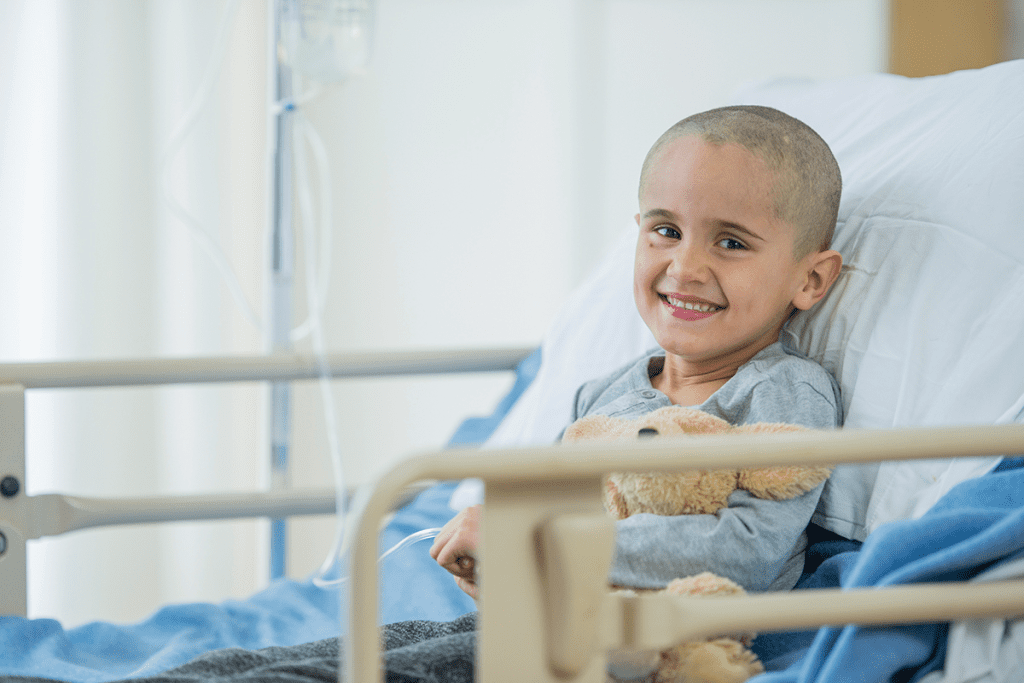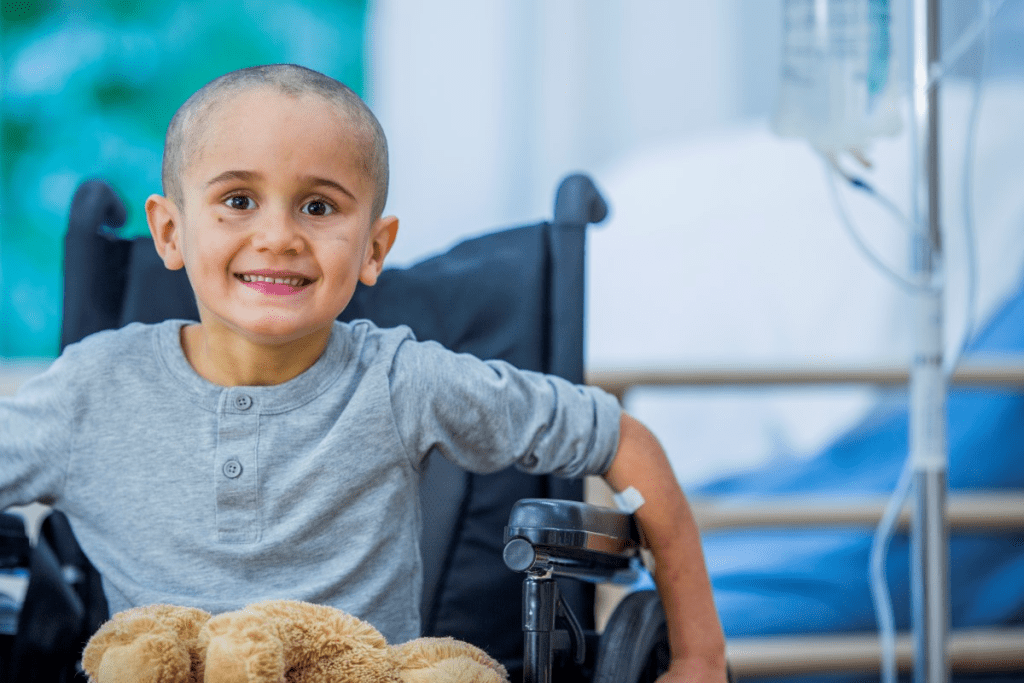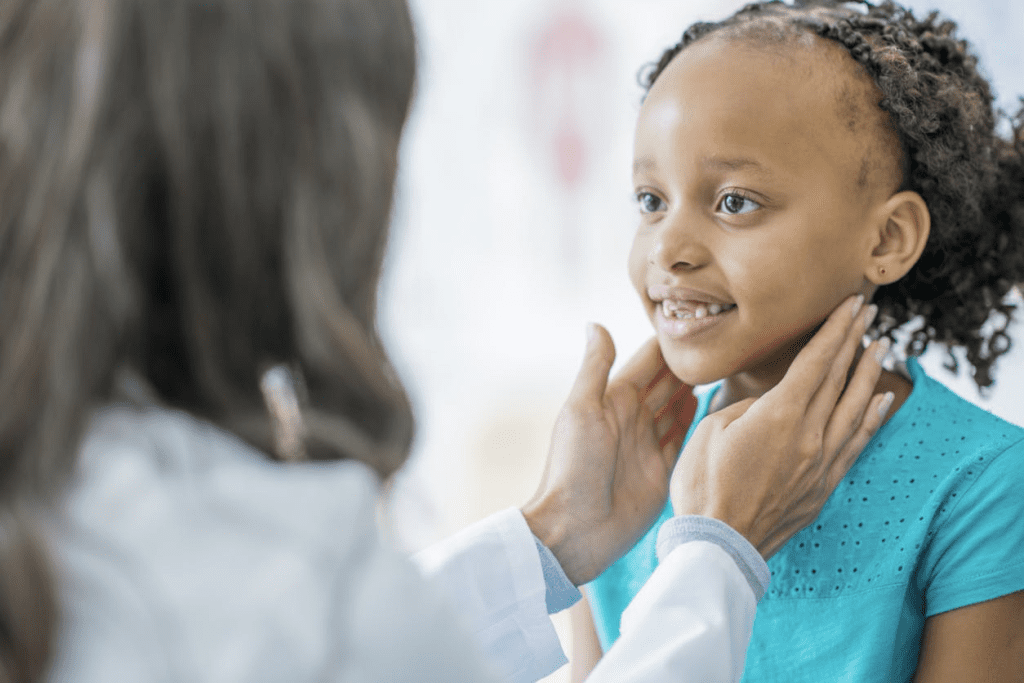Last Updated on November 13, 2025 by

A cancer diagnosis can be very tough for kids and their families. But it’s important for kids to keep learning. This helps them feel normal and keeps their minds active.
Many parents ask, “can you go to school with cancer? The answer is yes”though it often depends on the child’s health, energy, and treatment plan. When kids have cancer, they might miss school because of treatments or feeling sick. That’s why many hospitals have special schools or tutoring programs for children who are in the hospital.
School attendance is key for kids with cancer. It helps them feel normal and connected to friends. This is very important during treatment.
The decision to go to school is complex. It depends on the child’s health, treatment phase, and how their immune system is doing. The American Cancer Society says staying in school is vital. It helps kids feel connected and normal.
Kids with cancer often miss a lot of school. They might miss up to 30% or more of the school year. This affects their schoolwork and social life.
Knowing these stats helps us find ways to keep kids in school. We want to help them keep up with their studies and stay connected with friends.
About 70% of pediatric oncology providers think school attendance depends on the situation. They look at the child’s health and immune system. They also consider the treatment phase and overall health.
We work with families and doctors to decide about school. We balance education and socialization with treatment risks. Our goal is to support the child’s well-being and growth during tough times.

Understanding what affects school attendance for kids with cancer helps us support them better. We work to reduce learning gaps and manage treatment side effects. We also aim to create a supportive school environment.
Whether a child with cancer can go to school depends on many things. The Children’s Oncology Group says the type of cancer, treatment schedule, and health are key. These factors help decide if a child can go to school while getting treatment.

Several important factors affect a child’s school attendance during cancer treatment. These include the treatment’s phase and intensity, the immune system’s health, and physical symptoms and energy levels.
The phase and intensity of cancer treatment greatly impact school attendance. In the first, intense treatment phase, hospital stays are common, making school impossible. As treatment goes on and changes, so does the chance to go to school.
It’s important to think about the treatment schedule and how it affects daily life and energy. Treatments that make a child very tired might make it hard to do schoolwork.
A child’s immune system is another big factor. Cancer treatments can weaken it, making kids more likely to get sick. When the immune system is weak, it’s often best to keep kids away from crowded places like schools to lower infection risk.
Parents and healthcare providers must weigh the risks and think about whether school is worth the chance of getting sick. This choice depends on the child’s health and the treatment they’re getting.
Physical symptoms and energy levels are also key. Kids with cancer often feel tired, lose their hair, and have other symptoms that make school hard.
Having enough energy is vital for kids to do their schoolwork. When they’re too tired, it’s hard to keep up, so finding a balance between treatment and school is important.
In summary, deciding if a child with cancer can go to school involves looking at their treatment, immune system, and physical health. Understanding these factors helps families and doctors make the best choices about education during treatment.
Children with cancer face big challenges at school. Their treatment can last a long time and be very hard. It makes it tough for them to do well in school and make friends.
Cancer treatment can cause many side effects. These include feeling very tired, getting sick, losing hair, and changes in how they think. These can make it hard for kids to focus, learn new things, and get along with others.
Teachers and school staff are very important. They can help kids deal with these side effects by creating a supportive place.
Kids with cancer often have to go to many doctor visits. These visits can happen during school hours. It’s hard to fit school and doctor visits together.
Here are some ways to balance school and doctor visits:
The National Cancer Institute says kids with cancer might have trouble thinking clearly because of their treatment. This can make it hard for them to do well in school. They might have trouble remembering things, focusing, and processing information fast.
Schools can help by:
School absences due to cancer treatment deeply affect a child’s school performance and future. Kids with cancer often miss a lot of school. This can cause learning gaps and hurt their grades.
Studies show that kids with cancer miss almost twice as many school days as others. This big difference in school days can make them fall behind in school.
Missing school for cancer treatment can lead to lower grades. It also affects a child’s mood and self-confidence. Feeling left out of school activities can make them feel less motivated.
To lessen the impact of missing school, several steps can be taken. These include making learning plans just for the child, using online classes, and providing tutoring. This way, kids can keep up with their studies while getting treatment.
A study on the educational outcomes of children with cancer emphasized the importance of maintaining educational continuity during treatment: ‘The key to successful academic reintegration lies in the collaboration between healthcare providers, educators, and families.’ Implementing such collaborative approaches can significantly improve outcomes for children with cancer.
By using these strategies, we can lessen the impact of missing school on kids with cancer. This helps them reach their full academic and personal goals.
For kids with cancer, going back to school is more than learning. It’s about feeling normal again. School lets them connect with friends, keep up with schoolwork, and learn to cope.
Going back to school helps kids keep their peer relationships strong. Being with friends and classmates makes them feel supported and connected. We’ve seen that kids who stay in touch with friends do better during treatment.
Teachers and counselors are key in helping these friendships grow. They make sure everyone feels included and can socialize.
Keeping to normal routines is key for kids’ emotional health, even when they’re sick. School gives them a stable place to be. It helps them feel secure and keeps them grounded.
By doing regular school activities, kids feel like they’re part of something normal. This is important for their mental health.
School is not just about learning; it’s about building resilience. Kids with cancer face challenges and learn to handle different situations. This helps them develop coping skills.
Going back to school also boosts their confidence and sense of achievement. This is essential for their overall well-being.
Children with cancer are at higher risk for infections. It’s important to have strict school rules to keep them safe. These rules help them stay healthy while they go to school.
Keeping classrooms clean is key to stopping infections. Schools should make sure to:
The American Academy of Pediatrics says good hygiene is vital. It helps stop illnesses from spreading in schools. By following these steps, schools can lower the chance of infections.
Even with careful planning, sicknesses can break out. Schools need a plan to handle these situations:
Health experts stress the importance of acting fast. A quick and organized response is key to keeping students safe.
Students with cancer are more likely to get sick. They should take extra steps to stay safe:
Together, schools and families can make a safe place for kids with cancer to learn.
“The key to successful infection prevention in schools lies in a collaborative approach between educators, healthcare providers, and families.”
” An expert Opinion
Going back to school after cancer treatment is a big step for kids. It needs careful planning and support. We know that good school reintegration programs are key to helping them adjust.
These programs help kids get back to learning and adjust socially and emotionally. They work best when healthcare teams, teachers, and families work together.
Good school re-entry programs have a few important parts:
Teaching teachers and classmates is very important. When they know what’s going on, they can help the child more.
Here’s how to teach teachers:
For teaching classmates, you can:
Many cancer centers and hospitals have great re-entry programs. For example, some have a school liaison to help plan the child’s return.
“The school liaison program was instrumental in my child’s return to school. It provided much-needed support and guidance for both my child and the school.” – Parent testimonial
These examples show how well-planned reintegration can help kids do well in school and socially.
It’s important to know the laws that help students with cancer in school. Kids with cancer need special help to keep up with their studies. This helps make sure their school life isn’t hurt by their illness.
Laws like the Individuals with Disabilities Education Act (IDEA) and Section 504 of the Rehabilitation Act of 1973 help a lot. They make sure schools give the right help to students with medical issues, like cancer.
IEPs and 504 plans are key for students with cancer. An IEP is for those needing special education. A 504 plan is for those needing help because of a disability. Both are made just for the student to help them do well in school.
An IEP might have special goals and help for the student’s health, like more time on homework or a tutor in the hospital. A 504 plan might offer things like easier homework or breaks when needed.
Families are very important in fighting for their child’s school needs. Working with teachers and doctors is key to getting the right help. This teamwork creates a supportive school environment for students with cancer.
Knowing their rights and the educational help available helps families. This way, they can make sure their child does well in school and in life.
The journey through cancer treatment involves moving between hospital care, home life, and school. It’s important to keep education going during these times. This helps the child’s learning and emotional health. We know it’s tough for families and want to help.
Keeping education going in different places is key. Hospital schools and learning at home are important. We work with schools, doctors, and families to make learning plans that fit the child’s needs.
For example, hospital schools help kids keep up with schoolwork while they’re in the hospital. When they’re at home, learning continues. It’s adjusted to their health and energy.
Handling part-time school schedules is another big challenge. Kids with cancer might go to school part-time. This could be in person or online, depending on their health. We help families and schools make flexible plans.
These plans make sure kids can keep up with school while dealing with health issues. It’s important for doctors, teachers, and parents to talk often to make these plans work.
It’s important to plan for times when treatment might stop. Cancer treatment can change, with busy therapy times followed by rest. We tell families to work with their child’s school to plan for these breaks.
This way, kids can catch up on schoolwork when they’re feeling better. We want to help families keep their child’s education on track, even with cancer treatment.
Support resources are key for families dealing with a child’s cancer treatment. It can be tough to handle school while fighting cancer. But there are many resources to help families through this tough time.
Many cancer centers have school liaison programs. These programs help talk to schools and families. They make plans to meet the child’s educational needs during treatment.
These liaisons work with schools. They help with absences, assignments, and any special needs.
Parent support groups and networks are very helpful. They let families connect with others facing similar challenges. These groups offer emotional support and share useful tips.
They also plan educational activities for kids during treatment. Families can find these groups at local cancer centers, online, or through national organizations.
Cancer treatment can be very expensive for families. Luckily, some organizations offer financial assistance for educational support. They help with costs for school materials, tutoring, and more.
Families can look for this help through cancer support groups and foundations. These groups help families dealing with cancer’s financial and educational challenges.
Using these support resources can make it easier for families to manage their child’s education during cancer treatment. We suggest families check out these options. It helps ensure their child gets the educational support they need.
It’s key to balance a child’s education with their health if they have cancer. The American Cancer Society stresses the need to mix medical care with learning needs. This ensures kids get the support they need for their health and happiness.
At Liv Hospital, we know supporting kids with cancer means helping them in school and with their health. We use resources and school programs to help families deal with treatment challenges.
We aim to give full care that focuses on both health and learning. We work with families, teachers, and doctors to help kids with cancer do well in school and life. This way, we help them find a balance in their care.
Whether a child with cancer can go to school depends on many things. Their health, treatment plan, and risk of getting sick are key. We work with families and schools to help kids keep learning.
We look at their treatment phase, immune system, and how they feel physically. These things help us decide if school is possible.
Kids with cancer face many challenges. They have to deal with treatment side effects and keep up with school. They also might have trouble thinking clearly because of their treatment.
Kids with cancer miss a lot of school. This can hurt their grades and learning. We look for ways to help them catch up and keep learning.
Yes, going back to school is good for kids. It helps them stay connected with friends, follow a routine, and grow stronger.
Schools can help a lot. They can keep things clean, handle sickness outbreaks well, and help kids who are more at risk stay safe.
Kids with cancer have the right to get help in school. This includes special plans like IEPs and 504 plans to support them.
Families need to plan carefully to keep learning going. This means managing school schedules and dealing with treatment breaks.
There are many resources out there. School programs, support groups, and help with school costs can make a big difference.
Yes, online groups are a great help. They offer support and advice for families dealing with cancer and school challenges.
Subscribe to our e-newsletter to stay informed about the latest innovations in the world of health and exclusive offers!